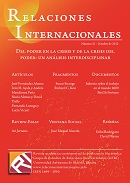Keywords:
financialization , accumulation, capitalism, power, state, democracy, financial system , banking systemCopyright (c) 2012 Iván H. AYALA, Andrés MENDIOROZ PEÑA

This work is licensed under a Creative Commons Attribution-NonCommercial-NoDerivatives 4.0 International License.
Abstract
This article aims to analyze from a multidisciplinary perspective (economic and political) the consequences of the financialization process, defined as a process of accumulation where the benefits are produced through financial channels. Our main hypothesis is that this pattern has not only changed the nature of private property but that it has also distorted “classic” capitalism based on production as well as the classical conception of the nation state as holder of sovereign power. Both facts allow us to say that we are in a new historical process of the capitalist system where the role of democratic sovereign states is transcendentally modified. The complexity of the concept of international financialization, and the large amount of train of thoughts derived, forced us to build our paper into two blocks: one economic and one political. First, we contextualize financialization within economic theory and briefly review the transformation of financial activities. Then we go into detail on the role of one of the main actors in this process: the banks. Our second block details the political implications of the financialization process and we argue that it has eroded certain attributes of the sovereignty of the State and that there has been a power transfer within the international system from the States and society towards the financial system. Second, we deduce that this transfer of power, accompanied and reinforced by the creation of a Shadow Banking System, has led to a shadow political system that is capable of degrading, at the national level, the very basic variables of a democratic political system, which is a different type of interference within the international system.





